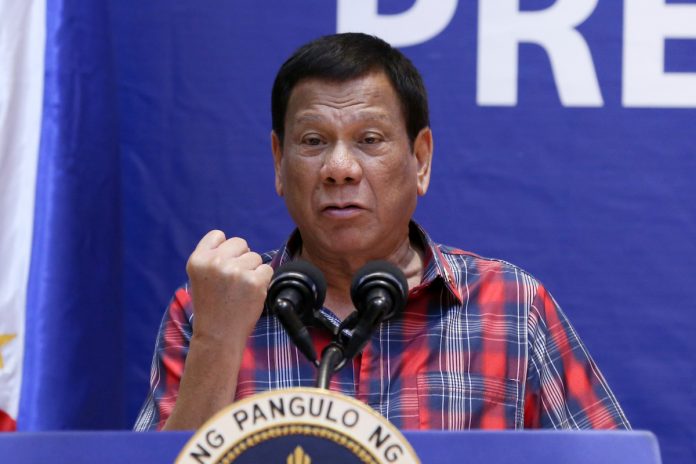President Rodrigo Duterte’s move to fire Vice President Leni Robredo as head of the Inter-Agency Committee on Anti-Illegal Drugs (ICAD) has amplified focus on the blackholes in his pet program that has cost thousands of lives over the last three years.
The first blackhole is the lack of transparency and accountability in law enforcement operations that have killed 6,000 Filipinos or the probes into triple that number murdered by masked vigilantes.
But it’s the second blackhole that threatens to implode Duterte’s anti-narcotics program — the inability or unwillingness of his government to rein in drug lords that manufacture and distribute illegal drugs.
“The vice president wanted to give the campaign a different direction,” said Father Daniel Pilario of the Congregation of Mission, popularly known as the Vincentians.
Father Pilario, a trained sociologist and dean of the St. Vincent School of Theology, is guest minister in the parish named “Mother of the Promised Land,” where more than 300 have died in the so-called war on drugs over the past three years.
“Drugs still flood in Payatas after three years of killings,” said Father Pilario of the sprawling slum and former dump site that hosts the parish. While police and masked men have killed hundreds of street peddlers, “known drug suppliers still continue to distribute,” the priest added.
“The vice president’s request for the list of high-value targets strikes at the heart of this problem. But they fired her for this — she went too close to home and the sanctuary of their drug lord friends,” the outspoken priest said.
Helter skelter
From the day Duterte challenged Robredo to take over the drug war to her firing, the country’s leaders tripped over each other to hurl taunts that inevitably unmasked the government’s main fears.
Duterte challenged Robredo on Oct. 28. He appointed her on Nov. 5 and fired her on Nov. 24.
Duterte’s men first pooh-poohed the capacity of Robredo, a lawyer and former public attorney. The strident attacks increased when she accepted the position, asking: “Are you ready for me?”
Her co-chair in the interagency body, Philippine Drug Enforcement Agency director-general Aaron Aquino, advised her to concentrate on rehabilitation and advocacy. When Robredo expressed her desire to “stop the killings,” he challenged her to join police operations.
Malacanang, the president’s office, initially invited Robredo to re-join the Cabinet for the first time since she was booted out as housing chief. Duterte took back the offer on Nov. 19 saying he did not trust Robredo. He accused Robredo of betraying his government by talking to UN officials who want to probe extra-judicial killings. He was wrong. Robredo limited meetings to just the United Nations Office on Drug and Crime (UNODC) and a U.S. government inter-agency working-level delegation.
Duterte apologized for accusing Robredo falsely. A few hours later, he fired her.

Stench of fear
It was Robredo’s requests for classified documents on the police, the meeting with U.S. officials and subsequent citing of Chinese crime gangs, and the request for the government’s list of “high value targets” that fanned the government hysteria.
Robredo met U.S. officials a few days announcing U.S. Ambassador Sung Kim’s offer to partner in the area of intelligence gathering. Representatives of the U.S. Federal Bureau of Investigation, Drug Enforcement Agency, Drug Enforcement Agency, the Department of State and U.S. Agency for International Development were at the meeting. The next day, Robredo said she would seek a meeting with Chinese officials, citing China as the prime source of illegal drugs.
Her co-chair swiftly contradicted her, claiming a crackdown by Beijing had forced drug syndicates to “outsource” shabu manufacturing to the Golden Triangle, the lawless border areas of Myanmar, Cambodia, Vietnam and Thailand. But the drugs manufactured there are brought back to China where overlords dictated distribution to various countries, including the Philippines, he admitted.
When Robredo requested for the list of high-value targets, Duterte aides said she was not cleared for the information. Panelo claimed giving Robredo the information would “imperil the welfare of the Filipino people and the security of the state.”
Dirty friends
If “state” is synonymous with administration, access to information could be a nightmare for Duterte. Twice, his appointees allowed in shabu shipments, each estimated to be worth US$130 million. In the second case, the president went out of his way to refute law enforcers’ claim of a successful try. Later, drug arrests in Mindanao, Duterte’s home island, traced the shabu to the shipment smuggled in through magnetic lifters.
Nicanor Faeldon, customs head during the first drug smuggling scandal stepped down. But Duterte later appointed him to an equally important gateway position and, later, to the Bureau of Corrections. There, Faeldon approved the “early release for good behavior” of at least four convicted Chinese drug lords.
Bato’s successor, PNP director-general Oscar Albayalde, also faced allegations that he sought leniency for former subordinates accused of keeping three-fourths of a big haul of interdicted shabu and then sending this back to the streets.
Both Faeldon and Albayalde stepped down from their posts but face no charges. Duterte was silent on Faeldon’s cryptic claim about just following orders. Senate probers also refused to take the bait. That chamber now includes former national police and corrections chief Ronald de la Rosa and the president’s closest assistant, Bong Go.
Robredo had urged a review of the drug war at this point, prompting the Duterte’s challenge. Now the fired vice president says she hasn’t started yet and will soon release her own findings into a mad war that hasn’t made a dent in the narcotics trade.









